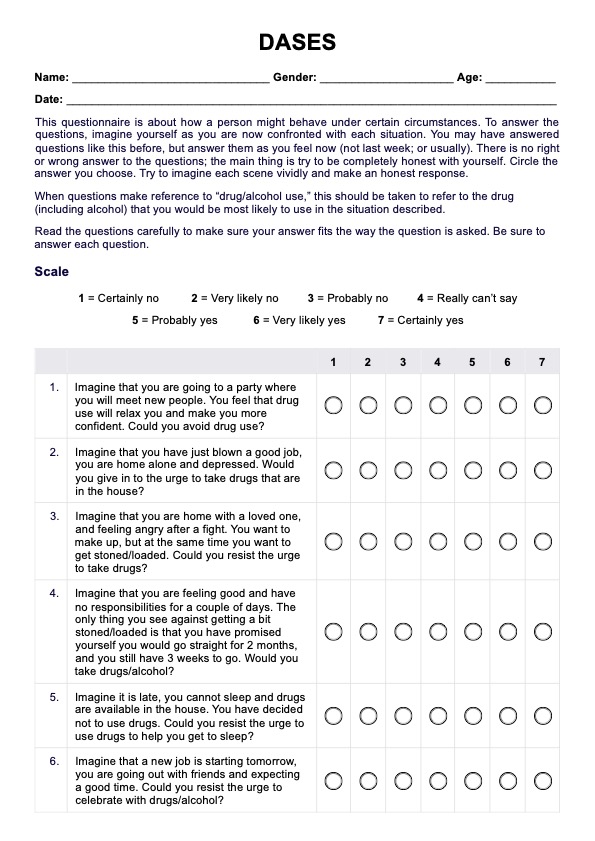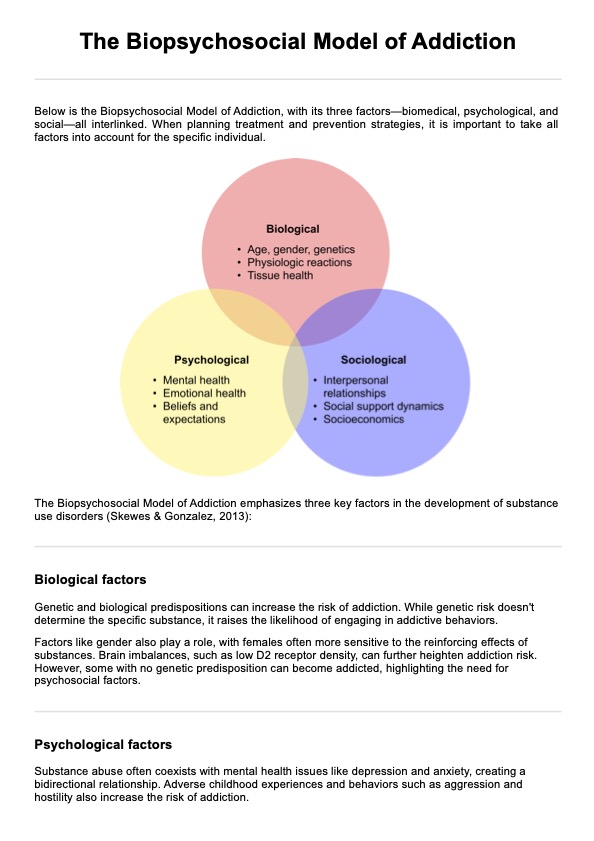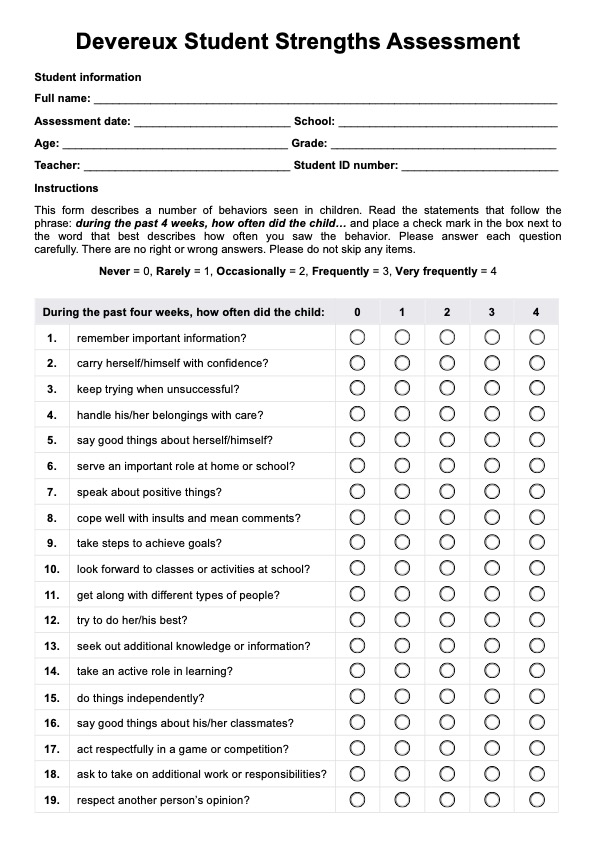Problem Gambling Severity Index (PGSI)
Use the Problem Gambling Severity Index (PGSI) to assess your patient for their problematic gambling risk.


What is a gambling disorder?
A gambling disorder is a type of mental disorder where a person exhibits problematic gambling behavior that involves continually partaking in bets and wagers despite any financial problems that gambling caused to the person before. Even if they've felt guilty over the negative consequences that problem gambling has had on their life, a problem gambler will likely continue to gamble. That same feeling they've felt the first time they've won a bet will not be lost on them, and they will still try to chase that high again.
While many people may start gambling casually for fun, a person with a gambling disorder will lose control over their gambling behavior. They may borrow money, sell possessions, or engage in other problematic behaviors to fund their gambling addiction. It all starts with saying, "I'll just occasionally spend on this for fun," but they might spend so much even if their financial situation dictates they can't really afford to lose track of the money they spend each month.
Consequences of problematic gambling
Here are some identified negative consequences and health problems gambling disorder may cause or lead to:
- Severe financial problems leading to the point of bankruptcy
- Have poor general health because of the lack of money to take care of oneself
- Decline in work competence and performance, which may lead to getting fired
- Relationship problems
- Development of maladaptive behaviors to find ways to get money for betting
- Self-harming/suicidal thoughts and behaviors
Problem Gambling Severity Index (PGSI) Template
Problem Gambling Severity Index (PGSI) Example
What is the Problem Gambling Severity Index (PGSI)?
The Problem Gambling Severity Index (PGSI) is an assessment developed by J. Ferris and H. Wynne in their 2001 Canadian Problem Gambling Index Report. It was created to screen people with potential gambling problems so appropriate intervention plans can be made and implemented and to see if treatment progresses for those confirmed to have gambling disorders.
How is it structured and answered?
The PGSI takes the form of a 9-item questionnaire and is issued mainly to problem gamblers or, at the very least, those who are suspected of having gambling problems to assess their gambling behaviour. Even a non-problem gambler can answer it to see if they fall at the risk of developing gambling problems.
Those taking the PGSI will answer the following questions:
- Have you bet more than you could really afford to lose?
- Have you needed to gamble with larger amounts of money to get the same feeling of excitement?
- Have you gone back on another day to try to win back the money you lost?
- Have you borrowed money or sold anything to gamble?
- Have you felt that you might have a problem with gambling?
- Have people criticized your betting or told you that you had a gambling problem, whether or not you thought it was true?
- Have you felt guilty about the way you gamble, or what happens when you gamble?
- Has gambling caused you any health problems, including stress or anxiety?
- Has your gambling caused any financial problems for you or your household?
They just need to rate each item between 0 to 3:
- 0: Never
- 1: Sometimes
- 2: Most of the time
- 3: Always
How is the PGSI scored, and how are the results interpreted?
The mental health professional who issued the PGSI only needs to add up the scores to calculate the total score. The lowest possible score is 0, and the highest is 27.
Once the total score has been calculated, the professional only needs to take note of the following score ranges and designations to see where the respondent falls:
- 0: No risk
- 1 to 4: Low-risk gambler
- 5 to 7: Moderate risk gambler
- 8 or higher: Problematic gambler
Next steps after conducting this test
Before you start coming up with interventions, it would be best to conduct other assessments and interviews concerning your patient with a potential gambling problem. Once you've gathered enough information, cross-check everything with the latest edition of the Diagnostic and Statistical Manual of Mental Disorders before making an official diagnosis.
Once the diagnosis has been made, then you should formulate intervention plans to help the patient stop their problem gambling.
How to use our PGSI template
If you believe that the Problem Gambling Severity Index is a useful tool for your mental health, therapy, or psychology practice, we'd like you to know that we created a template that you can print out or send digitally to patients with potential gambling disorders.
Our template just takes the questionnaire. We only added radio buttons for you to tick with a pen or a mouse click/screen tap!
The only other addition we added is a notes box so you can write down any comments you have concerning your patient's potential or confirmed gambling disorder.
Benefits of using this index
Help inform what goes into a treatment plan
The Problem Gambling Severity Index is a reliable assessment of gambling behavior severity, enough to help professionals determine the components of a treatment plan.
Treatment may involve the use of medication for those who are confirmed to have a gambling disorder that stems from mental health issues like depression and anxiety. It can also include being put in support groups so that others dealing with the same problem can relate to others and find solace in others who are trying to stop their gambling problems before they get any worse.
Therapy will likely be added, too. Cognitive behavioral therapy can help patients learn to fight gambling urges and reconfigure how they think about gambling. Relationship-focused therapy might be recommended, too, if the person has fractured relationships as a result of their problematic gambling.
It can be used as a monitoring tool
Using the PGSI doesn't have to be a one-time, big-time thing. Once the patient is confirmed to have a gambling disorder and they're undergoing treatment, you can schedule follow-up check-ups where you can reissue this assessment.
This is a good way to check if their problem gambling symptoms are weakening and if the treatment plans that were implemented are working as intended.
Commonly asked questions
Numerous factors can contribute to this. Some people engage in problem gambling behaviors because of their financial situation. They believe that with their little money, they can rake in more, even if the probability is low. Some develop such behaviors because of stressful life events or because of mental health issues.
The best way to gamble "responsibly" is to set limitations on oneself, like limiting how much time and money you'll spend. However, these limitations must be followed to a T, and the success of gambling "responsibly" will vary from person to person.
Yes. Gambling can turn into fraud or may lead to theft down the line when it becomes maladaptive.


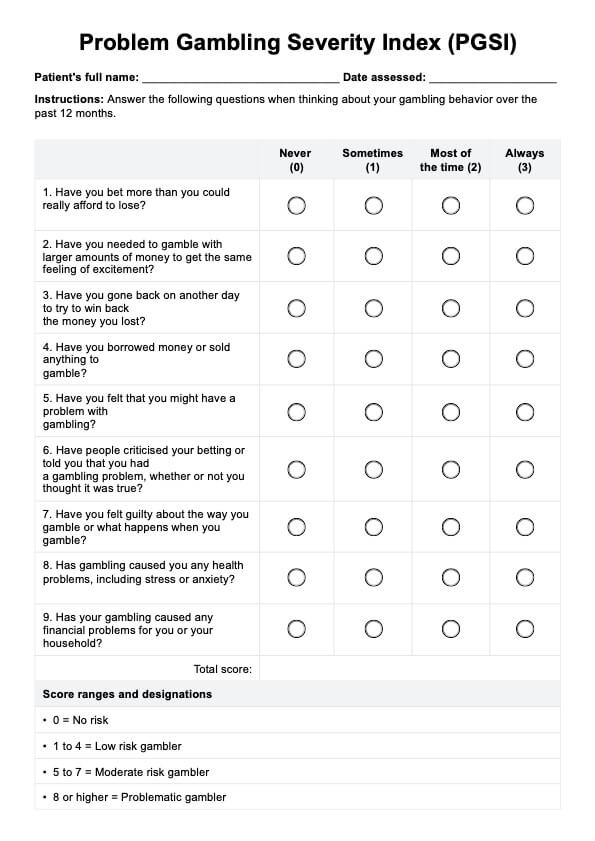
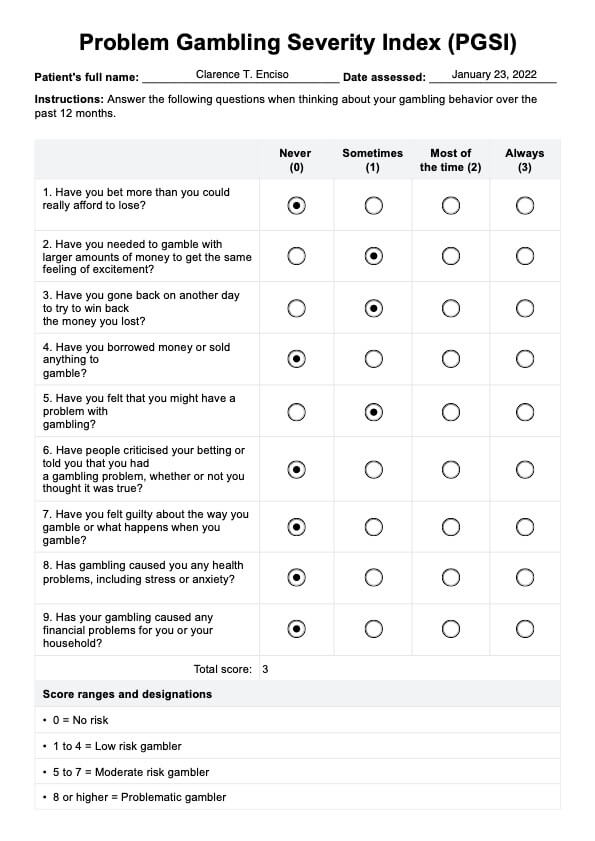
















-template.jpg)


